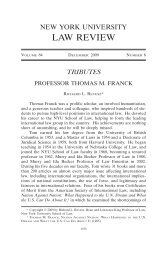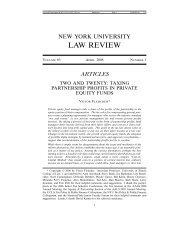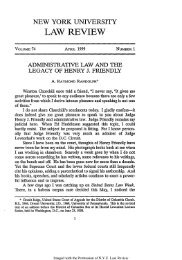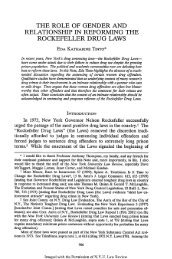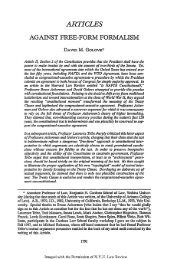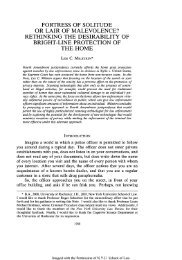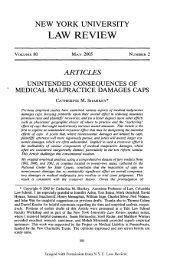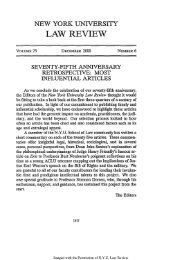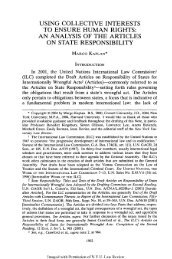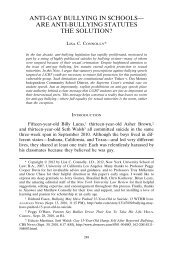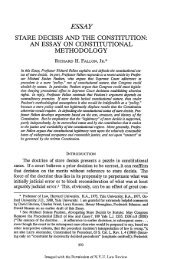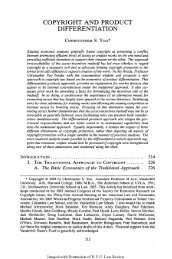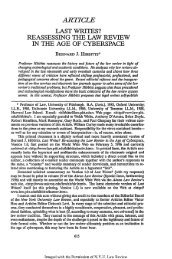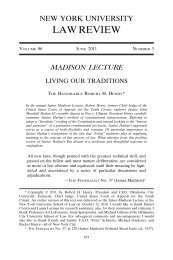Immigrants and the Right to Petition - NYU Law Review
Immigrants and the Right to Petition - NYU Law Review
Immigrants and the Right to Petition - NYU Law Review
You also want an ePaper? Increase the reach of your titles
YUMPU automatically turns print PDFs into web optimized ePapers that Google loves.
Imaged with <strong>the</strong> Permission of N.Y.U. School of <strong>Law</strong><br />
NEW YORK UNIVERSITY LAW REVIEW<br />
[Vol. 78:667<br />
Quasi-national documents also confirmed recognition of a right<br />
<strong>to</strong> petition. In 1765, <strong>the</strong> Stamp Act Congress affirmed "<strong>the</strong> right of<br />
<strong>the</strong> British subjects in <strong>the</strong>se colonies <strong>to</strong> petition <strong>the</strong> King or ei<strong>the</strong>r<br />
House of Parliament," '10 9 <strong>and</strong> <strong>the</strong> First Continental Congress declared<br />
that <strong>the</strong> colonists "have a right peaceably <strong>to</strong> assemble, consider of<br />
<strong>the</strong>ir grievances, <strong>and</strong> petition <strong>the</strong> King; <strong>and</strong> that all prosecutions, prohibi<strong>to</strong>ry<br />
proclamations, <strong>and</strong> commitments for <strong>the</strong> same, are illegal." 110<br />
The Declaration of Independence itself recited that "We have <strong>Petition</strong>ed<br />
for Redress in <strong>the</strong> most humble terms: Our repeated <strong>Petition</strong>s<br />
have been answered only by repeated injury." 1<br />
In contrast <strong>to</strong> <strong>the</strong> his<strong>to</strong>rical analysis in Verdugo-Urquidez, but<br />
consistent with English traditions, petitioning was a right exercised by<br />
all members of colonial society'<br />
2<br />
without regard <strong>to</strong> a petitioner's formal<br />
membership in "a national community or... o<strong>the</strong>rwise [having]<br />
developed sufficient connection with this country." ' 13 Disenfranchised<br />
white males, such as prisoners 14 a <strong>and</strong> those without property,<br />
11 5 as well as women, 116 free blacks,"1 7 Native Americans,' 1 8 <strong>and</strong><br />
Resolutions (May 16, 1769) (emphasis added), reprinted in 1 Documents on Fundamental<br />
Human <strong>Right</strong>s, supra note 106, at 176, 176).<br />
109 Declaration of <strong>Right</strong>s <strong>and</strong> Grievances (1765), reprinted in 1 Bernard Schwartz, The<br />
Bill of <strong>Right</strong>s: A Documentary His<strong>to</strong>ry 196, 198 (1971).<br />
110 Declarations <strong>and</strong> Resolves of <strong>the</strong> First Continental Congress (1774), reprinted in I<br />
Schwartz, supra note 109, at 215, 217.<br />
I The Declaration of Independence para. 30.<br />
112 Bailey, supra note 99, at 41 ("[A]II classes [in colonial Virginia] utilized petitions <strong>to</strong><br />
express <strong>the</strong>ir requests <strong>and</strong> grievances."); id. at 43 ("The right of petition was not restricted<br />
by any requirements involving class, sex, or even race."); Mark, supra note 84, at 2175 ("In<br />
no case did <strong>the</strong> colonial affirmation of <strong>the</strong> right [<strong>to</strong> petition] narrow <strong>the</strong> English right.");<br />
Higginson, supra note 103, at 153 ("Not only <strong>the</strong> enfranchised population [of colonial Connecticut],<br />
but also unrepresented groups-notably women, felons, Indians, <strong>and</strong>, in some<br />
cases, slaves-represented <strong>the</strong>mselves <strong>and</strong> voiced grievances through petitions." (footnotes<br />
omitted)); see also Ruth Bogin, <strong>Petition</strong>ing <strong>and</strong> <strong>the</strong> New Moral Economy of Post-Revolutionary<br />
America, 45 Wm. & Mary Q. 391, 392 (1988) (examining state petitions from mid-<br />
1760s <strong>to</strong> mid-1790s <strong>and</strong> concluding "[p]etitions, although used by all levels of American<br />
society, give us <strong>the</strong> voice of people who seldom if ever proclaimed <strong>the</strong>ir social goals <strong>and</strong><br />
political opinions in o<strong>the</strong>r written forms").<br />
113 United States v. Verdugo-Urquidez, 494 U.S. 259, 265 (1990).<br />
114 <strong>Petition</strong>s by disenfranchised prisoners are discussed in Mark, supra note 84, at 2181-<br />
82, <strong>and</strong> Higginson, supra note 103, at 146.<br />
115 Bailey, supra note 99, at 43-44 (describing petitions from indigent Virginians).<br />
116 Id. at 44 (discussing petitions from women in colonial Virginia); Mark, supra note 84,<br />
at 2183-84 (same in colonial Georgia); Higginson, supra note 103, at 153 n.74 (same in<br />
colonial Connecticut).<br />
117 Bailey, supra note 99, at 44-45 (recounting petitions from free blacks in Virginia).<br />
118 Mark, supra note 84, at 2186 (describing petitions by Native Americans), Higginson,<br />
supra note 103, at 144 n.9, 150 n.51, 151 & n.58 (same in colonial Connecticut).



